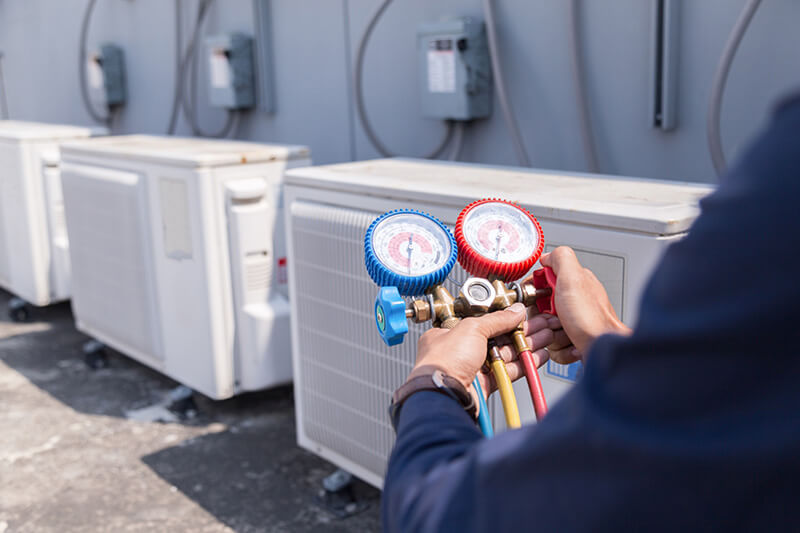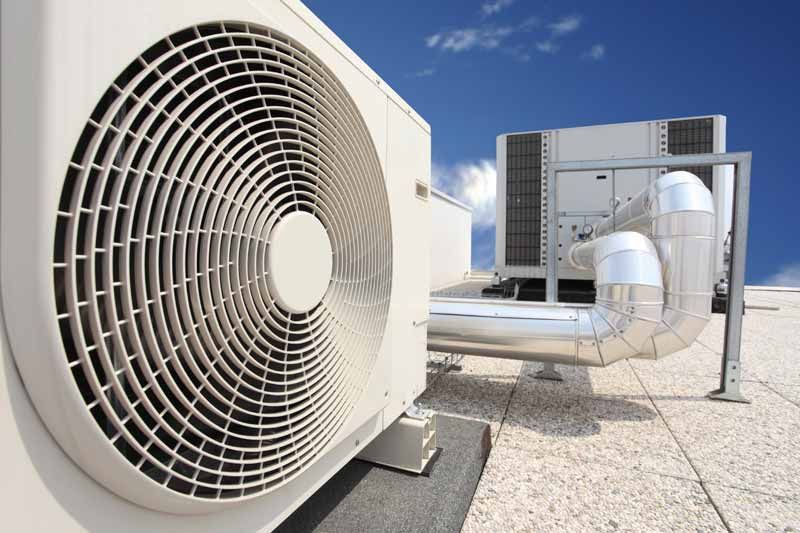The Ultimate Breakdown of ductless mini splits vs Central Heating Systems
The Ultimate Breakdown of ductless mini splits vs Central Heating Systems
Blog Article
Choosing In Between a Heat Pump and Heating System: Secret Factors To Consider for Your A/c Requirements
When examining heating alternatives for a/c needs, the choice in between a warm pump and a furnace can be intricate. Each system uses distinct advantages tailored to particular climates and energy performance goals. Understanding these differences is crucial for making an educated option. Trick factors such as installation costs and ecological effect even more make complex the option procedure. Which choice really straightens with one's comfort and sustainability preferences? The complying with areas will explore these considerations in detail.
Recognizing Heat Pumps: Exactly How They Function and Their Benefits
While many house owners take into consideration different heating choices, understanding just how warm pumps function and their advantages can considerably affect their decision. Heatpump run by moving heat instead of generating it. In the wintertime, they draw out heat from the outdoors air or ground and move it inside, while in the summer, they reverse this process, cooling down the home by getting rid of heat outside. This twin performance makes them flexible for year-round climate control.One of the primary benefits of warmth pumps is their power efficiency. They use considerably much less power contrasted to conventional heating unit, possibly leading to lower energy expenses (heat pump installation ooltewah tn). Additionally, heatpump have a smaller carbon footprint, making them an eco-friendly option. They likewise require less maintenance than standard systems, adding to long-term expense savings. In general, recognizing the mechanics and advantages of warm pumps can help home owners make notified choices regarding their home heating and cooling down demands
Discovering Heating Systems: Types, Operation, and Benefits
Heaters come in various types, including gas, electrical, and oil designs, each with distinctive functional devices. Recognizing these distinctions is crucial, as they influence efficiency and heating efficiency. Additionally, furnaces provide countless advantages, such as regular warmth outcome and integrity in chillier climates.
Sorts of Heating systems
Heating unit can differ considerably in layout and procedure, with heaters being a preferred choice among homeowners. There are a number of sorts of furnaces, each utilizing different fuel resources and modern technologies. Gas furnaces prevail, leveraging natural gas to generate heat effectively. Electric furnaces, on the other hand, make use of electric resistance to generate heat, frequently favored for their simple installation. Oil heating systems, while less typical, are reliable in locations with minimal gas gain access to (heat pump installation ooltewah tn). In addition, condensing heating systems optimize power efficiency by recycling and capturing exhaust gases. Each type runs with a system of warm exchangers and ductwork to distribute cozy air throughout a home. Understanding the differences in between these heater kinds is important for informed heating and cooling choices
Advantages of Heating systems
For property owners looking for reliable warmth throughout chilly months, the advantages of heating systems are considerable. Heating systems give consistent home heating, ensuring also temperatures throughout the home. They are especially effective in extreme chilly, typically outperforming warm pumps in icy conditions. Numerous types, consisting of gas, electrical, and oil heating systems, offer flexibility to fulfill diverse requirements and preferences.Furnaces likewise have a tendency to have reduced first installation expenses compared to heat pumps, making them an extra accessible alternative for several. Their robust layout adds to a much longer life-span, with numerous units lasting over 15 years with proper upkeep. In addition, modern-day heating systems are usually geared up with advanced technology for improved effectiveness, which can lead to lowered power bills. Overall, heating systems remain a trustworthy option for efficient home heating.

Power Effectiveness: Comparing Warm Pumps and Furnaces
When comparing energy performance between heat pumps and heaters, the Seasonal Energy Effectiveness Proportion (SEER) plays an important role in identifying performance. Additionally, a functional expense evaluation reveals the long-lasting monetary effects of each system. Comprehending these variables can assist homeowners in making educated decisions regarding their home heating solutions.
Seasonal Power Effectiveness Ratio
Energy efficiency plays a crucial role in the decision-making procedure between heat pumps and heaters, particularly when thinking about the Seasonal Power Effectiveness Ratio (SEER) This statistics measures the cooling performance of heatpump over an entire cooling period, offering a standardized method to examine efficiency. Higher SEER scores suggest higher energy performance, converting to reduced power consumption and minimized utility expenses. In comparison, heaters are typically analyzed utilizing the Annual Gas Use Effectiveness (AFUE) ranking, which mirrors home heating efficiency. When contrasting these two systems, property owners need to prioritize SEER ratings for warmth pumps, as they straight influence general energy financial savings and ecological sustainability. A detailed understanding of SEER can especially influence the lasting satisfaction and cost-effectiveness of the selected HVAC solution.
Functional Price Analysis
Comprehending the functional prices associated with warm pumps and heating systems is important for property owners examining their choices. Heatpump generally supply greater energy performance, converting electric power into heat with minimal waste. This causes lower regular monthly utility bills, specifically in moderate climates. Conversely, traditional heaters, specifically gas models, might have lower upfront expenses yet can sustain higher functional costs in time as a result of sustain prices and efficiency ratings.Moreover, warmth pumps can function as both heating and cooling systems, potentially decreasing the need for separate cooling and heating devices. While first investments for warmth pumps may be greater, their lasting cost savings in energy effectiveness can make them a more cost-efficient selection for several homes. Mindful evaluation of local power prices is necessary to establish the very best alternative.
Installment Prices: What to Anticipate for every Home Heating System
Installment expenses for furnace can differ considerably in between warmth pumps and heaters, influencing home owners' choices. Warm pumps normally have greater upfront setup prices, normally ranging from $3,500 to $8,000, relying on the system size and intricacy of installment. This consists of the outdoor unit, indoor handling system, and required ductwork modifications. Alternatively, heating systems tend to have reduced preliminary prices, balancing between $2,500 and $6,000, which can be appealing for budget-conscious home owners. Installation expenditures can boost if considerable ductwork is required.Moreover, the choice of fuel kind for heaters-- all-natural gas, lp, or electrical-- can additionally affect installation prices. While heatpump supply power efficiency, their preliminary financial investment might hinder some buyers. Ultimately, reviewing setup prices together with long-term financial savings and efficiency will certainly help homeowners in making educated decisions about their furnace.
Climate Factors To Consider: Which System Carries Out Much Better in Your Area
Just how do climate problems influence the effectiveness of furnace? The efficiency of warm pumps and heaters can vary greatly relying on the local environment. In modest climates, heatpump succeed by successfully moving heat from the outside air, making them an energy-saving alternative. Their effectiveness try this decreases in incredibly cold temperature levels, where they might battle to draw out sufficient heat. On the other hand, heating systems, particularly gas models, give reliable and constant heat no matter outside conditions, making them more effective in chillier regions.In locations that experience milder wintertimes, warmth pumps can run effectively year-round, offering both heating & cooling. In contrast, regions with extreme wintertimes usually take advantage of the robustness of furnaces. Ultimately, comprehending the regional environment is vital when determining between a warm pump and a furnace, as it directly affects their functional performance and total efficiency.
Maintenance Requirements: Long-Term Look After Warm Pumps vs. Furnaces
While both heatpump and furnaces call for normal maintenance to guarantee peak performance, their particular needs and care routines differ significantly. Heating systems normally need less constant attention, with yearly inspections being enough to look for gas leaks, clean filters, and evaluate total capability. Their easier style often permits simple repairs.In contrast, heatpump require biannual maintenance due to their twin function in heating and cooling. This includes cleansing coils, checking cooling agent levels, and ensuring that both the outside and indoor systems operate at their best. In addition, heatpump maintenance frequently includes even more intricate elements, making professional servicing essential.Neglecting maintenance can cause diminished performance and raised power costs for both systems. Ultimately, home owners must think about these long-term treatment demands when picking in between a heatpump and a furnace, as positive upkeep can expand the lifespan and performance of either system significantly.
Ecological Influence: Picking a Sustainable Heating Choice
The ecological impact of heating systems is a vital analysis for home owners seeking sustainable choices. Warmth pumps are usually more energy-efficient than conventional heating systems, as they transfer warm instead than create it, considerably reducing carbon exhausts. By making use of renewable resource sources, such as air-source or geothermal heat pumps, homeowners can further lessen their ecological footprint.On the various other hand, all-natural gas heating systems discharge greenhouse gases and add to air contamination, though they commonly supply higher heat result. However, innovations in technology have caused the growth of high-efficiency heaters that minimize emissions.Ultimately, picking a furnace entails considering performance versus ecological effect. Property owners are urged to assess local energy resources and rewards for eco-friendly systems, making certain a choice that straightens with both personal convenience and environmental obligation. The decision influences not only prompt comfort however additionally lasting sustainability and ecological health and wellness.
Frequently Asked Concerns
How Much Time Do Warm Pumps and Furnaces Normally Last?
The life-span of heatpump normally varies from 15 to two decades, while furnaces can last between 15 to thirty years. Normal maintenance considerably influences their long life and performance in supplying heating remedies.
Can I Use a Heatpump in Very Cold Climates?
Heatpump can operate in incredibly chilly environments, yet their efficiency diminishes as temperatures drop. In such conditions, supplementary heating sources may be necessary to preserve comfortable interior temperature levels and assure peak efficiency.

What Is the Noise Degree of Warmth Pumps Versus Furnaces?
The noise levels of warmth pumps and heating systems differ substantially. Typically, heat pumps run more silently than traditional furnaces, making them preferable for those sensitive to sound, while furnaces may produce louder operational sounds throughout home heating cycles.
Are Heat Pumps Suitable for Both Home Heating and Cooling?
Heatpump are undoubtedly suitable for both heating & cooling (heat pump installation ooltewah tn). They operate by transferring warmth, offering reliable temperature control year-round, read here making them a functional choice for homeowners seeking an all-in-one a/c option
What Size Heater Do I Required for My Home?
Determining the ideal size heating unit for a home calls for assessing variables such as square footage, insulation high quality, neighborhood climate, and the home's design. Consulting a specialist can guarantee a precise evaluation and optimal convenience. Heat pumps normally use greater power efficiency, converting electric energy into warmth with minimal waste. In moderate climates, warm pumps succeed by successfully transferring heat from the outside air, making them an energy-saving option. Alternatively, furnaces, especially gas models, supply reliable and constant warmth no matter of exterior problems, making them better in cooler why not try here regions.In locations that experience milder winters, warmth pumps can run effectively year-round, providing both heating and cooling. Warmth pumps are generally more energy-efficient than conventional heating systems, as they move warm instead than generate it, considerably lowering carbon discharges. By making use of renewable power sources, such as air-source or geothermal warm pumps, house owners can further reduce their ecological footprint.On the various other hand, natural gas heating systems emit greenhouse gases and contribute to air pollution, though they often supply higher warm result.
Report this page